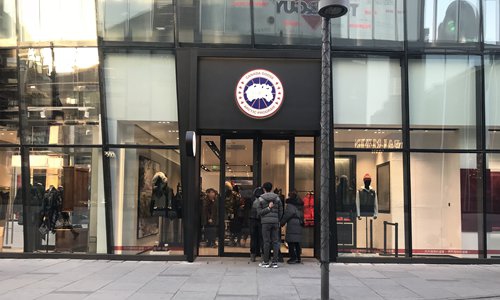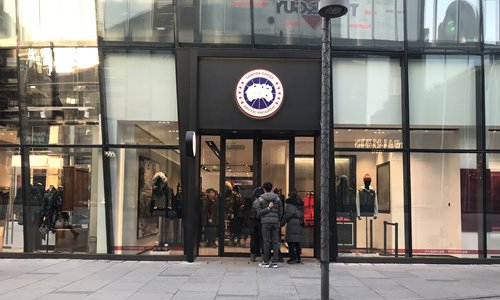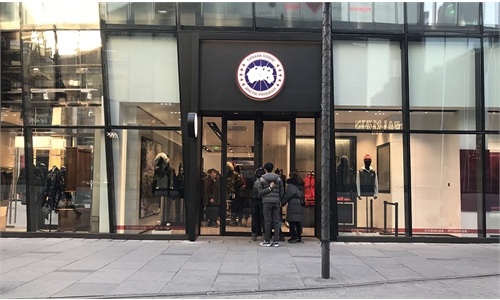Shanghai authorities summon Canada Goose for talks over double-standard selling policy

A Canada Goose store in Beijing Photo: VCG
The Shanghai Consumers Council summoned Canadian luxury parka maker Canada Goose for talks on Wednesday over its controversial product return policy in the Chinese mainland, urging the firm to submit an official interpretation of the policy by noon on Thursday.
Canada Goose is playing with fire as it is still applying a "double standard", treating the China mainland market differently from other markets, industry watchers said, noting that foreign firms that have such differentiated operations are rarely seen in China.
The Canadian firm's product refund policy ignited a backlash among Chinese consumers starting on Tuesday, after a Chinese consumer who bought a down jacket at a Canada Goose store in Shanghai on October 27 reportedly claimed she could not return the jacket after finding the logo was incorrectly embroidered.
She also was asked to sign a document that had a return policy on it, with the first clause saying that "Unless otherwise provided by applicable laws, all products sold at Canada Goose's retail stores in the Chinese mainland are strictly non-refundable."
On October 28, the consumer filed a complaint with the store, but the manager said that she could not refund the product and the request would have to go to higher levels of the company.
"We are aware of the case and discussions. Canada Goose strictly abides by the laws and regulations as they relate to refund policies," Canada Goose said in a statement sent to the Global Times on Wednesday.
"In the first clause, the policy outlines that all products sold at Canada Goose's retail stores in the Chinese mainland are refundable, subject to applicable laws. The policy also states in the seventh clause that 'the exchange policy does not affect customers' rights under applicable laws'," the company said.
Despite Canada Goose's denial prior to talks with the authority, it had already ignited anger among Chinese consumers saying they won't buy the brand's products anymore.
"It's ridiculous that Canada Goose makes a lot of money out of the booming Chinese market while not respecting the country's laws and consumers," a netizen said on Weibo.
Meanwhile, confusion over its policy continues at some of its retail stores.
The Global Times visited two physical retail stores of Canada Goose on Wednesday, one in Beijing and one in Shanghai, finding that both have the controversial "non-refundable" policy posted in their stores.
A salesperson in a Canada Goose store in a luxury shopping mall in Beijing told the Global Times on Wednesday that product change-overs are workable, but as for a refund, they are in accordance with the rules posted.
The Global Times contacted a salesperson from a Canada Goose retail store in Southwest China's Chongqing city via telephone, who said that they had noticed the company's official statement but that "products are only refundable when it abides by the laws and regulations in China."
The salesperson could not explain clearly what that means in the context of regular consumer transactions.
"At the level of a retail store, we do not have the power of interpretation, and we need to report refund requests to the upper levels of the business," the salesperson told the Global Times.
Representatives of Canada Goose who attended the talks with the relevant Shanghai authority said they "are not clear" about the specific meaning of the first clause of the refund policy.
The company's refund process as described by the attendees is different from the actual situation reported by the consumers, according to the official WeChat account of the Shanghai Consumers Council.
"The company's attendees' lack of knowledge of its corporate policy and the specifics of the case indicated that there is chaotic business management," Zhang Yi, CEO of the iiMedia Research Institute, told the Global Times on Wednesday.
"It is a consumer's right to request exchange and return of goods within a reasonable scope, and it is the obligation of merchants to communicate with consumers in a timely manner and help resolve the issue," said Xu Hao, a lawyer at the Beijing-based Jingshi Law Firm. "Any foreign brand should abide by the laws of the Chinese market if it has business operations locally," Xu said.
Apart from Canada Goose's inability to handle the matter in a timely manner, the company's double standards have drawn a backlash from Chinese consumers.
As revealed by the talks with the Shanghai consumer authority, when asked whether the terms of the refund policies in stores outside the Chinese mainland were consistent with those in the mainland, company attendees said that they "are not clear."
For the online sales channel, the double standard of operations is clear: The company representatives confirmed the relevant clauses on the 30-day unconditional refund on the Canada Goose official website, and stated that this clause does not apply to the Chinese mainland, where a 7-day unconditional refund clause applies.
"I think that the Canadian firm holds some prejudice against mainland consumers and it seems to have blind confidence in its practice," Zhang said, noting that foreign firms that have such differentiated operations are now rarely seen in China, since it's a foolish practice.
In 2016, Ikea recalled 29 million sets of drawers in the US and 6.6 million in Canada after the Swedish furniture retailer was linked to the deaths of six children in the US after some of its furniture tipped over easily. Ikea made it clear that it would not recall the same products in China, the Xinhua News Agency reported.
Recently, French fashion brand Dior failed to convince Chinese customers over its controversial photo of a spooky Asian woman. Prior to this, Italian luxury fashion house Dolce & Gabbana met with fierce criticism for a video accused of insulting China and Chinese culture.
Brand arrogance, prejudice against Chinese consumers, making money without showing appropriate respect, which will only lead to a "hard lesson" for those brands, industry watchers warned.
The refund policy is unlikely to destroy the business of Canada Goose in the mainland market, but no brand can afford waves of crisis.
"I think that the event will leave some scar on Chinese consumers, and its brand influence and reputation will accordingly be crippled," Zhang noted.
In September, Xiji (Shanghai) Trading Co, a Canada Goose-related company in China, was fined 450,000 yuan ($69,750) by the market regulator in Shanghai for falsely advertising goods or services, and deceiving and misleading consumers about its parkas' material.
Known for its bright red parkas, Canada Goose has benefited from the rising purchasing power of Chinese middle-class consumers over recent years. It has opened more than 15 retail stores in the mainland market.
The company said in early November that it is eyeing a strong holiday season this year, as it benefits from surging demand for its luxury parkas in China, Reuters reported.
As Chinese domestic brands such as conglomerate Bosideng are ramping up efforts to produce quality down jackets, it is likely the down jacket market will be reshaped, Zhang said.


